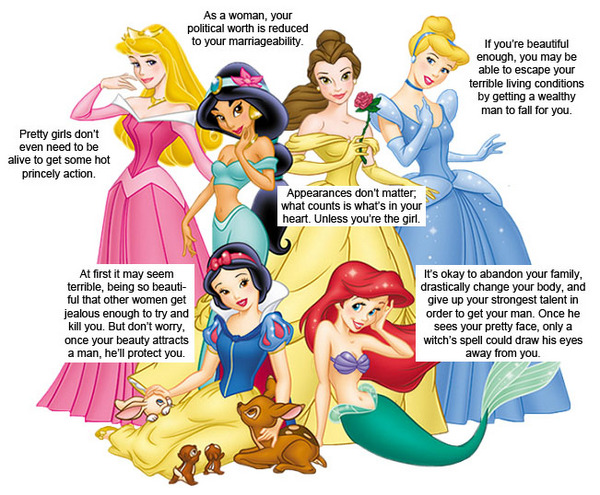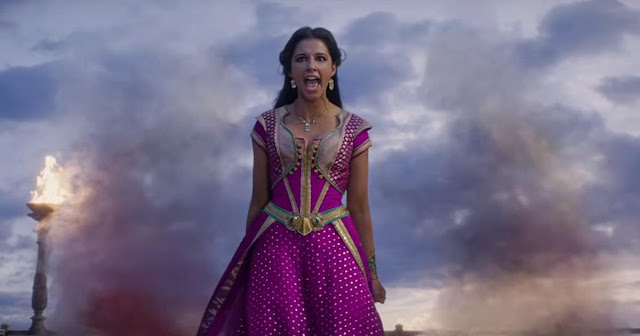The "Damsel in Distress" Stigma
I recently saw a fantastic YouTube video analyzing the stigma that the title character from Disney's 1950 Cinderella is inherently weak despite enduring years of abuse and maintaining a strong survival instinct. It got me thinking about one of the most common criticisms people have toward princesses, which is that being a "Damsel in Distress" is a poor influence on girls. My issue with this is that it implies these characters somehow choose to put themselves in horrible situations in an attempt to be rescued by a prince. Why would anyone choose to be placed in such awful situations? They wouldn't. Just because many of the older princesses do find a way out of their unfortunate circumstances through the love of a prince (which is no longer the case) does not imply that they were the masterminds behind their own abuse. In fact, if they had intentionally put themselves in these situations, they would certainly have some extremely messed up psychological issues.
There's no arguing that modern-day Disney sees these issues as problematic, considering how much they have changed their princesses over the past decade. However, there is such a thing as overcorrecting. I would argue that creating young women such as Moana, who are so strong that they never need to ask for help, conveys the message that a modern princess must be able to take on any challenge entirely by herself and is wrong or weak if she struggles. Yes, Moana does need her grandmother's ghost to boost her confidence, but in the end, everything falls on her. There's a delicate balance here between telling girls that they can do anything and letting them know that it's okay to ask for help sometimes. However, that help does not always need to come in the form of a romantic interest, which may be the crux of the stigma behind "Damsel in Distress" syndrome.
The only princesses who are guilty of placing themselves in danger are from comedic video games such as Dragon's Lair and Super Mario Bros. Daphne and Peach do seem to enjoy getting kidnapped and being rescued by the games' respective heroes, but this is done in a satirical way that makes fun of the trope that princesses tend to get kidnapped or cursed a lot. They are supposed to be mindless fun and not meant to be taken seriously. Video games have a different format of storytelling than film, TV, or prose, so it's understandable that the characters might come off as less realistic.
Stories that focus on princesses as the main characters make them easier to relate to by putting them in more realistic circumstances that are out of their control. People who blame Cinderella or Snow White for being abused by their wicked stepmothers have a clear lack of understanding or sympathy for the characters which prevents them from being able to truly appreciate their struggles. These fairy tale princesses are women who overcome disaster and should be celebrated for their victories, not berated from bringing their troubles upon themselves. In their own ways, both of these characters attempted to escape their unfortunate circumstances without the help of a prince. Snow White ran from the Huntsman who tried to kill her until she found the cottage of the Seven Dwarfs, and Cinderella went to the ball as a way to get away from her own miserable life.
Telling girls that it is wrong to relate to characters who face unfortunate circumstances is similar to telling them that they should never have problems in real life or else they are not strong enough. This is a form of mild psychological abuse in itself. Everyone goes through difficult times, and to try to deny that would be denying an inherent truth. As Neil Gaiman once put it, "Fairy tales are more than true: not because they tell us that dragons exist, but because they tell us that dragons can be beaten." To take the danger away from fairy tales is also to take away the very important message to children that their problems can be overcome, no matter how impossible it may seem. That is a lesson that people going through difficult times need when they see princesses overcome their curses.
That's not to say that princesses have never played the role of the hero either. Hans Christian Andersen was particularly progressive in that many of his fairy tales were about strong women who saved men from fatal circumstances. In "The Little Mermaid," for instance, the mermaid rescued her prince from drowning. Thus, it is rather unfortunate that she gets so much criticism for changing herself to be with him later. Does someone as selfless as her not deserve to find happiness? "The Snow Queen," another Hans Christian Andersen tale, tells the story of a girl who overcame endless trials to rescue her friend Kay who was seduced by the Snow Queen due to the powers of a magic mirror. The strength of Gerda's character was vastly diminished by Disney's Frozen, which wrongfully perpetuated the "Damsel in Distress" stigma by altering a story that could have very much contradicted it.
We should never tell impressionable children that it is not okay to ask for help if they face dire circumstances. Replacing the old princess trope with one that implies that girls should be able to take on any challenge entirely on their own is both unrealistic and potentially dangerous. As important as it is to be able to stand up for yourself and tackle challenges head-on, not everyone is capable of overcoming every situation alone. Even though princesses trapped in unfortunate circumstances was once used as an excuse for romantic subplots that are less relevant in today's world, it does not mean that princesses must now take on the responsibility of handling every role in their stories. That is too much to ask of anyone.
There's no arguing that modern-day Disney sees these issues as problematic, considering how much they have changed their princesses over the past decade. However, there is such a thing as overcorrecting. I would argue that creating young women such as Moana, who are so strong that they never need to ask for help, conveys the message that a modern princess must be able to take on any challenge entirely by herself and is wrong or weak if she struggles. Yes, Moana does need her grandmother's ghost to boost her confidence, but in the end, everything falls on her. There's a delicate balance here between telling girls that they can do anything and letting them know that it's okay to ask for help sometimes. However, that help does not always need to come in the form of a romantic interest, which may be the crux of the stigma behind "Damsel in Distress" syndrome.
The only princesses who are guilty of placing themselves in danger are from comedic video games such as Dragon's Lair and Super Mario Bros. Daphne and Peach do seem to enjoy getting kidnapped and being rescued by the games' respective heroes, but this is done in a satirical way that makes fun of the trope that princesses tend to get kidnapped or cursed a lot. They are supposed to be mindless fun and not meant to be taken seriously. Video games have a different format of storytelling than film, TV, or prose, so it's understandable that the characters might come off as less realistic.
Stories that focus on princesses as the main characters make them easier to relate to by putting them in more realistic circumstances that are out of their control. People who blame Cinderella or Snow White for being abused by their wicked stepmothers have a clear lack of understanding or sympathy for the characters which prevents them from being able to truly appreciate their struggles. These fairy tale princesses are women who overcome disaster and should be celebrated for their victories, not berated from bringing their troubles upon themselves. In their own ways, both of these characters attempted to escape their unfortunate circumstances without the help of a prince. Snow White ran from the Huntsman who tried to kill her until she found the cottage of the Seven Dwarfs, and Cinderella went to the ball as a way to get away from her own miserable life.
Telling girls that it is wrong to relate to characters who face unfortunate circumstances is similar to telling them that they should never have problems in real life or else they are not strong enough. This is a form of mild psychological abuse in itself. Everyone goes through difficult times, and to try to deny that would be denying an inherent truth. As Neil Gaiman once put it, "Fairy tales are more than true: not because they tell us that dragons exist, but because they tell us that dragons can be beaten." To take the danger away from fairy tales is also to take away the very important message to children that their problems can be overcome, no matter how impossible it may seem. That is a lesson that people going through difficult times need when they see princesses overcome their curses.
That's not to say that princesses have never played the role of the hero either. Hans Christian Andersen was particularly progressive in that many of his fairy tales were about strong women who saved men from fatal circumstances. In "The Little Mermaid," for instance, the mermaid rescued her prince from drowning. Thus, it is rather unfortunate that she gets so much criticism for changing herself to be with him later. Does someone as selfless as her not deserve to find happiness? "The Snow Queen," another Hans Christian Andersen tale, tells the story of a girl who overcame endless trials to rescue her friend Kay who was seduced by the Snow Queen due to the powers of a magic mirror. The strength of Gerda's character was vastly diminished by Disney's Frozen, which wrongfully perpetuated the "Damsel in Distress" stigma by altering a story that could have very much contradicted it.
We should never tell impressionable children that it is not okay to ask for help if they face dire circumstances. Replacing the old princess trope with one that implies that girls should be able to take on any challenge entirely on their own is both unrealistic and potentially dangerous. As important as it is to be able to stand up for yourself and tackle challenges head-on, not everyone is capable of overcoming every situation alone. Even though princesses trapped in unfortunate circumstances was once used as an excuse for romantic subplots that are less relevant in today's world, it does not mean that princesses must now take on the responsibility of handling every role in their stories. That is too much to ask of anyone.













Comments
Ironically, Anna, with her desire to fall in love with the first boy she passes by and then staying with the second she meets, is no more empowered than Gerda who faced a dangerous journey and the Snow Queen to save someone she had known since childhood.